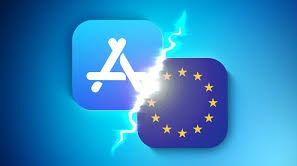Apple is going to change the way apps work in Europe by letting **third-party app stores with iOS 18**. This is a big change brought about by the Digital Markets Act (DMA). Beginning on September 16, 2024, European customers will be able to download apps from locations other than the official App Store on their iPhones and iPads. This will greatly increase the options available to both consumers and developers.
This action comes after the EU called Apple a “gatekeeper” and set new restrictions to end Apple’s long-standing monopoly on the distribution of iOS apps. For a long time, Apple’s App Store was the only place to get apps, and it controlled their availability, prices, and user experience with an iron grip. By adding support for third-party stores and direct app installs from developer websites, iOS 18 promises a delightfully diversified and competitive app market. It’s like freeing a carefully caged ecosystem into a buzzing swarm of possibilities.
But Apple’s evolution is a well planned approach that combines following the rules with taking precautions. Even with this change to a more pluralistic system, core functionality like Screen Time, parental controls, and Spotlight search are still *very* dependable. That being said, apps that are not part of the Apple ecosystem lose access to Apple’s secure commerce infrastructure. This means that consumers will have **limits on in-app purchases, refunds, and subscription management**. Apple says that decentralized distribution comes with built-in hazards including malware, frauds, and system weaknesses. They put a lot of the responsibility for safety and fraud prevention on users and third-party marketplaces.
The consequences are already spreading through the app sector. Setapp Mobile, AltStore, and BuildStore are new players that are *very innovative* third-party platforms that meet specific demands, such as productivity and creative tools. This variety breaks down the walls that Apple’s exclusivity has kept indie developers from breaking through, making space for a more lively, user-centered software environment.
Apple’s compliance also brings about major changes in how market power and platform accountability are measured. The DMA’s harsh punishments, which can go as high as 10% of global sales for violations, show how serious the situation is. Apple’s new App Store cost structure is unique to this change. It now has tiered pricing and no longer has anti-steering restrictions. This shows that Apple is doing a *highly efficient* job of balancing regulatory obligations with business needs.
The new iOS 18 landscape gives EU users and developers:
– **Access to more than one app store**, breaking the one-store rule.
– **Ability to install programs straight from developers’ websites**, which skips the usual steps.
– New options for independent developers to contact users without any problems.
– **Possible savings and new ways to pay, like through third-party processors.
– **Increased focus on privacy and security**, which means users need to be careful.
– Keeping important Apple features like Screen Time, even while there are limits on commerce.
– A more competitive market that encourages tech innovation and gives consumers more control.
This change marks a turning point where rules encourage openness instead of limiting new ideas. Apple’s use of these features shows that it is ready to change how platforms are run by accepting diversity, shared responsibility, and customer choice while still upholding its basic values of privacy and security.
In the end, Europe’s bold move to regulate sends ripples around the tech world, challenging one of the biggest companies to make app distribution more open and varied. This urbanizing moment for iOS suggests that in the future, getting to apps will feel less like navigating a fortress and more like browsing a busy market full of choices.
With iOS 18, Apple gives us more than simply a software update; they provide us a strategic turning point. In the future, how we find and use apps will be richer, more open, and more personalized. For users in Europe, this marks the start of a more dynamic, safe, and competitively creative app economy that will thrive under smart regulation and shared ownership.






